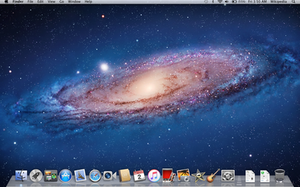
Back ماك أو إس إكس ليون Arabic Mac OS X Lion Catalan Mac OS X 10.7 Czech Mac OS X Lion Danish Mac OS X Lion German Mac OS X Lion Spanish Mac OS X Lion Estonian Mac OS X Lion Finnish OS X Lion French Mac OS X Lion ID
| Version of the macOS operating system | |
 Screenshot of OS X Lion | |
| Developer | Apple Inc. |
|---|---|
| OS family | |
| Source model | Closed, with open source components |
| General availability | July 20, 2011[2] |
| Latest release | 10.7.5 (Build 11G63) / October 4, 2012[3] |
| Update method | Apple Software Update |
| Platforms | x86-64 |
| Kernel type | Hybrid (XNU) |
| License | Apple Public Source License (APSL) and Apple end-user license agreement (EULA) |
| Preceded by | Mac OS X Snow Leopard |
| Succeeded by | OS X Mountain Lion |
| Official website | Apple - OS X Lion - The world's most advanced OS. at the Wayback Machine (archived June 9, 2012) |
| Tagline | The world's most advanced desktop operating system advances even further. |
| Support status | |
| Historical, unsupported as of about October 2014.[4] iTunes is no longer supported as of September 2015. Drops support for iTunes Releases from 4 to 7 | |
| Part of a series on |
| macOS |
|---|
OS X Lion,[5][6] also known as Mac OS X Lion,[2] (version 10.7) is the eighth major release of macOS, Apple's desktop and server system for Mac computers.
A preview of OS X 10.7 Lion was publicly shown at the "Back to the Mac" Apple Special Event on October 20, 2010. It brought many developments made in Apple's iOS, such as an easily navigable display of installed applications, to the Mac, and includes support for the Mac App Store, as introduced in Mac OS X 10.6 Snow Leopard version 10.6.6.[7][8] On February 24, 2011, the first developer's preview of Lion (11A390) was released to subscribers to the Apple Developer program.[9] Other developer previews were subsequently released, with Lion Preview 4 (11A480b) being released at WWDC 2011.[10]
Lion was released to manufacturing on July 1, 2011,[11] followed by its final release via the Mac App Store on July 20, 2011. Apple reported over one million Lion sales on the first day of its release.[12] As of October 2011[update], OS X Lion had sold over six million copies worldwide.[13] Mac OS X 10.7.1 was the last version of Mac OS X released under CEO Steve Jobs. 10.7.2 and later were released under CEO Tim Cook. 10.7.5 added Gatekeeper.[14]
Lion is the first version of macOS that did not support 32-bit processors and is also the final release whose development was overseen by Bertrand Serlet, considered to be the "founding father of Mac OS X".[15]
Although originally paid, Apple later allowed free downloads of the OS, especially for customers of older and no longer officially supported Mac computers, starting on June 30, 2021.[16][17] The same practice was applied to its successor, OS X Mountain Lion.
- ^ "Apple technology brief on UNIX" (PDF). Apple. Archived (PDF) from the original on September 17, 2012. Retrieved November 5, 2008.
- ^ a b "Mac OS X Lion Available Today From the Mac App Store" (Press release). Apple Inc. July 20, 2011. Archived from the original on October 9, 2017. Retrieved January 11, 2018.
- ^ "OS X Lion 10.7.5 Supplemental Update". October 4, 2012. Archived from the original on February 28, 2022. Retrieved February 28, 2022.
- ^ "Apple security updates". Apple. October 21, 2015. Archived from the original on October 16, 2015. Retrieved November 3, 2015.
- ^ "Apple - OS X Lion - The world's most advanced OS". July 22, 2011. Archived from the original on July 22, 2011. Retrieved June 9, 2021.
- ^ "OS X Lion - Technical Specifications". support.apple.com. Archived from the original on June 9, 2021. Retrieved June 9, 2021.
- ^ Graham, Jefferson (October 21, 2010). "New Apple MacBook Air costs less, plus App Store is coming". USA Today. Archived from the original on September 10, 2012. Retrieved September 4, 2017.
- ^ Fried, Ina (October 20, 2010). "Apple unveils new MacBook Airs, previews Lion". CNET. Archived from the original on December 28, 2021. Retrieved December 28, 2021.
- ^ Ex (February 25, 2011). "Apple Seeds First Mac OS X 10.7 Lion Build 11A390". iPhoneinCanada.ca. Archived from the original on June 11, 2011. Retrieved June 7, 2011.
- ^ "Apple devs get iTunes 10.5 beta, Apple TV 2 beta, Xcode 4.2 Preview and Lion Preview 4". AppleInsider. June 6, 2011. Archived from the original on June 9, 2011. Retrieved June 7, 2011.
- ^ "OS X Lion Golden Master seeded to developers ahead of July launch". July 2011. Retrieved September 22, 2023.
- ^ "Apple's Lion roars onto computers with 1 million downloads in a day". The Independent. UK. July 22, 2011. Archived from the original on July 23, 2011. Retrieved July 22, 2011.
- ^ Tim Cook (October 4, 2011). "Apple Special Events October 2011". Apple Inc. Archived from the original on October 24, 2017. Retrieved October 6, 2011.
- ^ Horowitz, Paul (September 19, 2012). "OS X Lion 10.7.5 Update Available, Includes Bug & Wi-Fi Fixes, Adds GateKeeper".
- ^ "Craig Federighi: Top 10 Facts You Need to Know". heavy.com. UK. June 12, 2013. Archived from the original on August 8, 2018. Retrieved August 8, 2018.
- ^ "Apple goes retro with free downloads of OS X Lion and Mountain Lion". Macworld. Archived from the original on June 30, 2021. Retrieved June 30, 2021.
- ^ "Mac OS X Lion Installer (UK)". support.apple.com. Retrieved February 10, 2023.